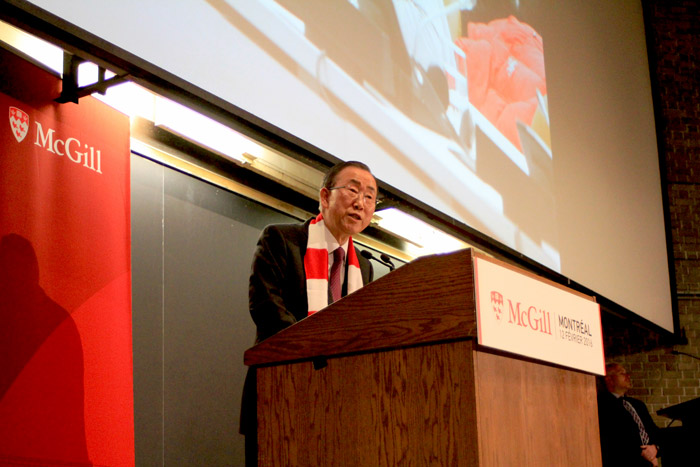McGill University welcomed the Secretary-General of the United Nations (UN) Ban Ki-moon on Feb. 12 as part of his three-day visit to Montreal and Ottawa. Ban spoke to a group of law, political science, and international development students from McGill and other Montreal universities on topics ranging from youth empowerment to addressing nuclear weapons testing in North Korea.
McGill Principal Suzanne Fortier introduced Ban, and spoke to the importance of the United Nations as a whole for students in university.
“The United Nations is an important arena for crucial dialogues about subjects such as education, health, human rights, the environment—all areas of great importance to universities,” Fortier said.
Throughout his speech, Ban addressed the importance of empowering today’s youth and involving them in political considerations.
“We have to put young people in influential positions,” Ban said. “Humanitarian action must address the concerns of young people and we need to mobilize young people in our humanitarian discourse.”
Ban reminded McGill students to be aware of their potential for global change.
“You are not here at McGill University just for yourselves,” Ban said. “You are given highest learning just to become a global citizen, [and] have a global vision [….] You have immense potential, your future is wide open, [and] therefore it’s up to you to choose how you can contribute to this world.”
[URIS id=43438]
Ban additionally spoke to issues that today’s youth will need to address in the immediate future—particularly, climate change.
“Climate change represents an intergenerational injustice,” Ban said. “The older generation has not taken care of the planet that young people inherit. You will be continuously affected and influenced by this lack of what our generation and our previous generation have neglected.”
Following the speech there was a question and answer period moderated by McGill Political Science Professor Krzysztof Pelc. Pelc raised concerns over the UN’s inability to prevent North Korea from testing nuclear weapons.
“Last week North Korea tested another rocket launch,” Pelc said. “Is it time to say that the UN’s strategy towards North Korea has failed?”
In response, Ban expressed his frustrations with the lack of effective action that has been seen in regards to North Korea.
“It is really agonizing, very frustrating, not only as secretary-general, but more as one of the Korean citizens who have been working for peace and stability on the Korean Peninsula,” Ban said. “Sometimes I feel ashamed. How come I have not been able to make any meaningful contribution to [the] current situation?”
In terms of future plans, Ban recommended the resumption of six-party talks as a possible step in the right direction.
“I think we should […] try to negotiate if necessary,” Ban said. “There is an interesting format, known as six-party talks. Six parties should sit down together [to discuss] how to realize denuclearization of the Korean peninsula. That is, I think, the most proper way.”
Five rounds of six-party talks initially took place from 2003 to 2007 following North Korea’s withdrawal from the nuclear Non-Proliferation Treaty. North Korea, however, pulled out of the talks in 2009, citing the UN Security Council’s Presidential Statement condemning a failed North Korean satellite launch.
Ban emphasized the necessity of responding quickly to any weapons testing undertaken by North Korea.
“My message to Security Council members is that they should take action as soon as possible,” Ban said. “It has been more than a month [….] The longer it takes, it may just give the wrong impression […] to North Korea that they may just keep on going with another test, another launch, so that is not a good message.”









